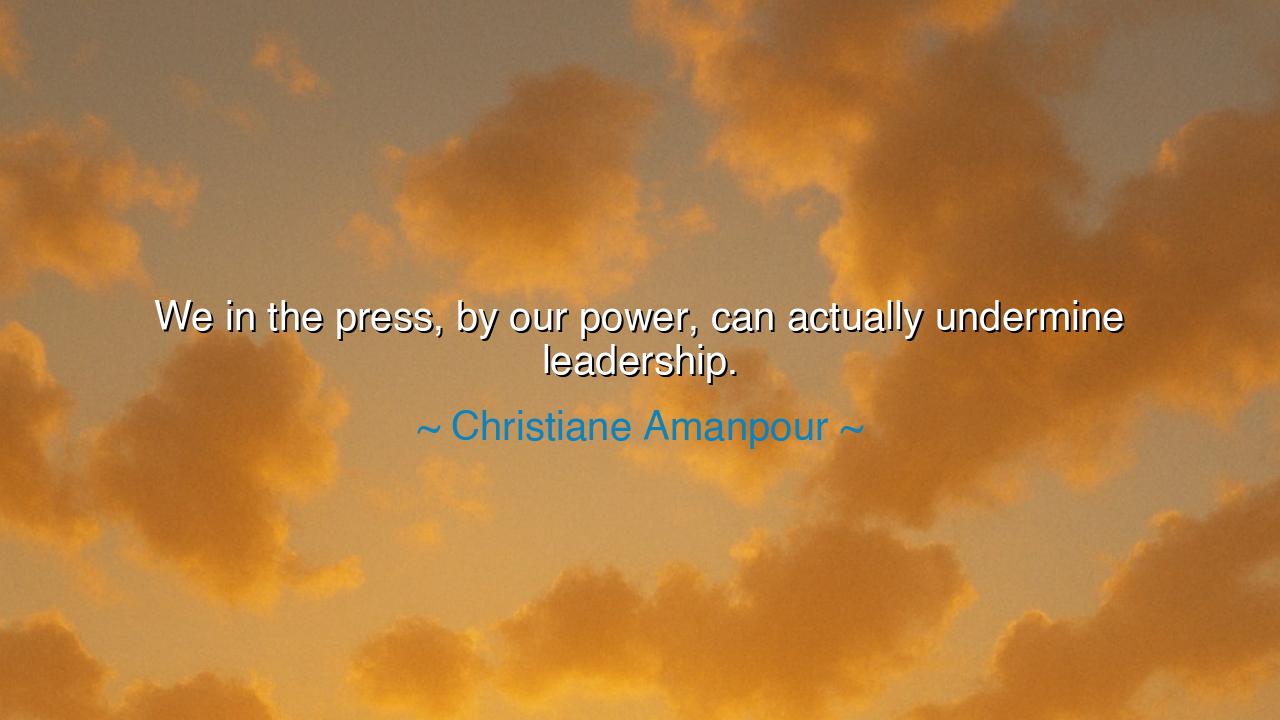
We in the press, by our power, can actually undermine leadership.






The words of Christiane Amanpour strike with the force of a double-edged sword: “We in the press, by our power, can actually undermine leadership.” In this admission, she unveils a truth both noble and dangerous—that the press, the voice of the people, holds within it the capacity to strengthen or to weaken those who govern. For journalists, by uncovering corruption and holding leaders accountable, serve the cause of truth; yet by distortion, bias, or relentless assault, they may also erode trust, diminish authority, and sow chaos. This power is immense, and like all immense power, it must be wielded with great care.
What Amanpour acknowledges is the ancient tension between truth and authority. Leaders, by their very nature, depend upon the trust of those they guide. Without trust, even the most capable leader falters. The press, however, is entrusted with uncovering truth—and truth often wounds. In exposing lies, failures, and abuses, the press may preserve the people’s freedom but also weaken their confidence in leadership. Thus, the journalist walks a perilous path: to shine light on corruption without extinguishing faith in the very institutions that must carry society forward.
History reveals the weight of these words. During the Vietnam War, it was not the battlefield alone that shaped the outcome, but the images and reports carried by the press into American homes. Photographs of suffering, reports of mismanagement, and revelations of dishonesty eroded public trust. Leaders who once commanded obedience found themselves stripped of legitimacy. The war was not lost by arms alone, but by the collapse of confidence fueled by the press’s relentless exposure. This was not evil, but it was power—power that reshaped history.
Yet history also shows the press as the defender of liberty. When Watergate erupted in the United States, it was journalists like Bob Woodward and Carl Bernstein who uncovered the corruption at the highest level of government. Their work did indeed undermine leadership—but leadership that had already corrupted itself. By doing so, they protected democracy, reminding the world that no ruler stands above accountability. Here the power of the press became not destructive, but redemptive, restoring integrity by tearing down deceit.
The deeper meaning of Amanpour’s words is a recognition of responsibility. To wield the pen or the camera is to wield a weapon that can build or destroy. Leaders may rise or fall by the press’s portrayal; nations may prosper or falter depending on whether the truth is spoken with fairness or twisted by prejudice. The press is not merely a mirror of society, but a force that shapes it, for words once spoken can inspire revolutions, topple governments, or ignite wars. Such power demands humility, restraint, and devotion to truth above all else.
The lesson for us, then, is that freedom of the press is both blessing and burden. Citizens must cherish it, for without it, tyranny thrives; but they must also demand integrity, for without honesty, the press itself becomes an agent of tyranny. Those who write, speak, and report must remember that their task is not to destroy for destruction’s sake, but to reveal truth in the service of justice. And those who read must learn discernment, lest they be carried away by the winds of sensationalism and manipulation.
Therefore, O listener, take Amanpour’s words as both warning and guide: the press can undermine leadership. But whether this undermining is an act of justice or an act of recklessness depends upon the virtue of those who wield its power. As leaders must govern with wisdom, so too must journalists report with conscience. And as citizens, we must hold both accountable, for only then can the delicate balance between truth and authority endure. Guard the press, honor truth, and demand fairness—for in these lies the lifeblood of freedom.






AAdministratorAdministrator
Welcome, honored guests. Please leave a comment, we will respond soon